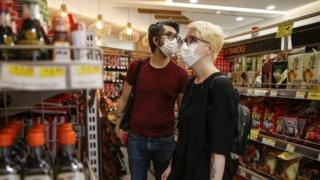 Image copyright Getty Images
Image copyright Getty Images Face coverings are now compulsory for customers in shops in England, after new coronavirus rules came into force within 12 hours of the government issuing guidance on the change.
Coverings are mandatory in enclosed public spaces such as supermarkets, indoor shopping centres, transport hubs, banks and takeaways.
Police can hand out fines of up to £100 to those who do not comply.
But some retailers have insisted they will not enforce the rule.
Sainsbury’s and Costa Coffee said their staff will not challenge customers who enter their stores without masks, while Asda said enforcement was the «responsibility of the relevant authorities».
But Waitrose will have staff at the entrance reminding customers of the rule, and Tesco will be selling face coverings at shop entrances.
Greggs and McDonalds said takeaway customers need to wear masks.
Guidance issued by the government on Thursday for England states that staff in premises where face coverings are required are encouraged to take steps «to promote compliance with the law» and can refuse entry to people who do not have a valid exemption under the rules.
However, the government said it was the responsibility of individuals to wear one.
It is not compulsory for shop workers to wear face coverings but the government said it «strongly» recommended that employers consider their use where appropriate.

Media playback is unsupported on your device
Police will be able to «use force» to remove customers from shops if they do not wear face coverings, as well as prevent them from entering, according to the College of Policing.
But forces have said they will only be enforcing the rules, including issuing the £100 fines, as a last resort – and officers will not be patrolling premises.
There are exemptions to the new rules for children under 11, those with disabilities or certain health conditions, such as respiratory or cognitive impairments that make it difficult for them to wear a face covering.
Public Health England has warned parents not to buy coverings for babies and young children because of the risk of choking or suffocation.
Masks will not be mandatory in indoor venues that have other safety measures in place, including:
- Eat-in restaurants
- Pubs
- Hairdressers and salons
- Gyms and leisure centres
- Cinemas, concert halls and theatres
- Visitor attractions like museums
Can police make me cover my face?
The Police Federation, which represents front-line officers, says they can’t spend their time patrolling thousands upon thousands of outlets.
Shop staff and security guards can already detain shoplifters while waiting for the police to arrive and police leaders hope shop managers will refuse non-mask wearers entry – rather than turning to the police to solve the problem.
Met Commissioner Dame Cressida Dick has said that police in London would only enforce the wearing of coverings in shops «as a last resort» – if people not wearing a covering refused to leave a shop or became «aggressive».
Retail and trade organisations have criticised the government over the length of time taken for the guidance to be published, after the measure was announced more than a week ago.
Meanwhile, union leaders voiced fears the rules could put workers’ safety at risk if there are abusive customers or people who refuse to wear a mask.
The British Retail Consortium called on customers to be «respectful» of the new rules, while UKHospitality chief executive Kate Nicholls said takeaway outlets had been left with «a very short time to properly brief staff, prepare signage and take steps to encourage compliance».
According to the government, face coverings should cover the mouth and nose and can be as simple as a scarf or bandana that securely fits around the side of the face without having to be held in place.
The requirement to wear face coverings at transport hubs – railway and bus stations, airports and maritime ports – only applies for those areas which are fully indoors and enclosed.
You are allowed to remove a face covering in certain situations, for example to prove identification in banks or when buying age restricted products.
Face coverings have been compulsory in shops in Scotland since 10 July. Shoppers are not currently required to wear them in Wales or Northern Ireland, although NI will wait until 20 August before deciding whether to make them compulsory.
Coverings are already compulsory on public transport in England and Scotland, as well as most buses, trains and ferries in Northern Ireland. They will be mandatory on public transport in Wales from 27 July.
- ‘COVIDIOTS’, ‘LOXIT’, ‘ZUMPED’: Examining the language we’ve learnt in lockdown
- ALHAN ON FAMILY: Navigating post-lockdown relationships
